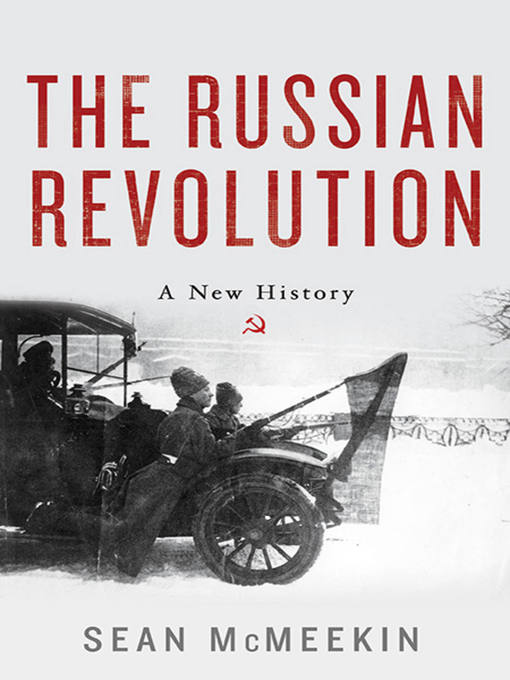
The Russian Revolution
A New History
کتاب های مرتبط
- اطلاعات
- نقد و بررسی
- دیدگاه کاربران
نقد و بررسی

April 17, 2017
In this brisk history, McMeekin (Ottoman Endgame), professor of history at Bard College, reevaluates the 1917 Russian Revolution on its centennial. With strong scholarly foundations and a riveting narrative, this book provides a broad survey of this tumultuous and fateful social transformation—the dethroning of the czar, the Bolsheviks’ improbable rise to power, and the establishment and consolidation of Bolshevik rule. McMeekin begins with a detailed background, reviewing czarist rule, its weaknesses, and its persistence. The turmoil of WWI roused simmering tensions and the Romanov regime collapsed amid charges of defeatism and treason—and growing protests, strikes, and mutinies. McMeekin navigates the complex political ructions as various factions vied for power, culminating in the Bolsheviks’ triumph. Developments in subsequent years threatened Bolshevik rule, but their victory was solidified with the 1922 Treaty of Rapallo, where the book concludes. McMeekin’s analysis privileges wartime action over the various factions’ raisons d’être, and he suggests—based on flimsy evidence—that Lenin was a German agent and the Bolshevik insurrection was rooted in German strategic policy. The work claims to be “unmediated by our current prejudices,” but it is emphatically anti-Bolshevik. Despite the glaring divergence between its objective and its content, this fluid work offers an overview of the revolution’s wartime context. Maps & illus. Agent: Andrew Lownie, Andrew Lownie Literary (U.K.).

April 1, 2017
A fresh history of the revolution "as a concrete historical event--controversial and significant in its lasting impact on world politics, but also worth understanding on its own terms, unmediated by our current prejudices."McMeekin (History/Bard Coll.; The Ottoman Endgame: War, Revolution, and the Making of the Modern Middle East, 1908-1923, 2015, etc.) refreshingly doesn't muddy the waters with too many characters, but he is thorough in his treatment, which is that much more interesting due to the wealth of information released following the downfall of the Soviet Union. "Fortunately for historians of the revolution," he writes, "the years since 1991 have seen an explosion of research into Russia's military performance in World War I from 1914 to 1917." Of course, Lenin springs to mind as the great leader of the revolution, but when he finally appeared, he had been out of the country for years. However, he knew that the country needed an enemy to unite against, and Germany wouldn't provide it; troops were bored and ripe for infiltration by the Bolsheviks. The author also explores the explosive Order No. 1, effectively telling troops to disarm officers, as well as Lenin's abilities to control the armed forces, one of the keys to Bolshevik success. His goal was not revolution but civil war, and he got it: "Lenin's imperative was to transform the 'imperialist war' into a civil war." However, the author points out how easily things might have gone the other way. Peter Stolypin's 1906 agriculture reforms pleased nearly everyone, and the army was well taken care of. Czar Nicholas II does not escape McMeekin's scrutiny, either. His ineffectiveness and reliance on Rasputin turned the people away, even though it was Rasputin who warned him about the war. McMeekin effectively shows how easily one man could undermine the foundations of a nation, and he makes the revolution comprehensible as he exposes the deviousness of its leader.
COPYRIGHT(2017) Kirkus Reviews, ALL RIGHTS RESERVED.

April 15, 2017
Competing against a slew of titles commemorating the 100th anniversary of the 1917 Russian Revolution, McMeekin (history, Bard Coll., The Ottoman Endgame) seeks to compile a definitive and seminal analysis utilizing newly accessible archival research. The book spans a wider timeframe starting in 1905 to allow more perspective on contributing events leading to the uprising. Additionally, the goal is to "rediscover the revolution as it transpired in real time, from the perspective of key actors who did not know, as they acted, how the story would turn out." The rise of what we now know as communism was not always a forgone conclusion. This title is similar to S. A. Smith's Russia in Revolution: An Empire in Crisis, 1890 to 1928, which also covers an extended timeframe on both sides of the revolution within a broader critical analysis. But McMeekin succeeds in offering a fresh take through inclusivity of contributing events beyond the depth of all other titles. However, this inclusivity is at times its weakness, as the work becomes overwhelming with lesser-known personages and events. VERDICT A well-written and rewarding read on the Russian Revolution's lasting historical import. Essential for research collections, scholars, and informed readers.--Jessica Bushore, Xenia, OH
Copyright 2017 Library Journal, LLC Used with permission.

























دیدگاه کاربران